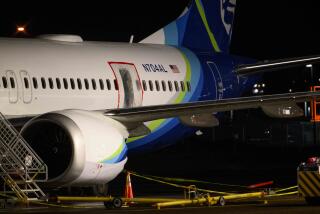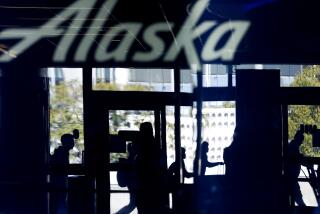Southwest’s Earnings Decline
- Share via
Southwest Airlines, Alaska Air Group Inc. and United Parcel Service Inc., providing the first major evidence of the financial effect of the Sept. 11 terrorist attacks on the air-transportation system, Thursday posted sharp declines in their third-quarter profits compared with a year earlier.
But the financial damage will look much worse when the other major airlines announce their third-quarter results in the coming days. Those results are expected to show enormous losses for such major carriers as AMR Corp.’s American Airlines and UAL Corp.’s United Airlines.
The U.S. airline industry overall is expected to lose $7 billion to $10 billion for 2001, owing to an unprecedented two-day shutdown of civilian air travel after the attacks and a subsequent plunge in passenger traffic and reduced freight shipments. But even before Sept. 11, most carriers were facing a dismal third quarter.
Dallas-based Southwest, though, reported third-quarter results that matched analysts’ forecasts. The low-fare, short-hop carrier said earnings were $82.8 million, or 10 cents a diluted share. That’s excluding one-time charges and gains, including its portion of the $5-billion federal bailout of the airline industry.
But Southwest’s results were down 55% from earnings of $184.3 million, or 23 cents a share, a year earlier. Including the $144 million that Southwest received as its first portion of the bailout and other gains and charges, Southwest’s net income in the latest quarter was $151 million, or 19 cents a share. Its third-quarter revenue fell 10% to $1.34 billion.
Southwest’s chief financial officer, Gary Kelly, reiterated at a conference call with analysts that the carrier has no plans to scale back its service, which involves about 2,800 daily departures in 30 states, most of which are in California and elsewhere in the West.
The airline plans to fly “basically the same schedule” until at least April, Kelly said.
But he also disclosed the damage Southwest incurred following the attacks. During the shutdown, Southwest canceled about 9,000 flights. Its load factor--the percentage of seats filled--plunged to 45% in the two weeks after Sept. 11, nearly 30 percentage points below its level before the attacks. But the load factor has steadily climbed back to about 67%.
However, much of the added traffic was sparked by Southwest’s fare sales. And the cheaper fares aren’t offsetting Southwest’s costs enough to enable the airline to operate at a profit on a daily basis, Kelly said.
Seattle-based Alaska Air said its third-quarter profit--excluding the federal aid--plunged 54% to $7.3 million, or 27 cents a share, from $15.9 million, or 60 cents a share, a year earlier. Its revenue fell 3% to $583.4 million.
UPS, meanwhile, said third-quarter profit fell 19% to $568 million, or 50 cents a share, from $702 million, or 60 cents, a year earlier. Revenue edged up 1.5% to $7.5 billion.
The giant package-delivery concern said that with the post-Sept. 11 effect on freight deliveries, its total U.S. ground and air volume for the quarter fell 3.4% to 11.9 million packages from 12.3 million a year earlier, producing a 13% drop in the group’s pretax operating profit, to $895 million from $1.03 billion.
Looking ahead, the Atlanta-based company said it’s “quite difficult to predict this year’s holiday buying and shipping season and the prospects for any rapid economic turnaround.”
More to Read
Inside the business of entertainment
The Wide Shot brings you news, analysis and insights on everything from streaming wars to production — and what it all means for the future.
You may occasionally receive promotional content from the Los Angeles Times.











